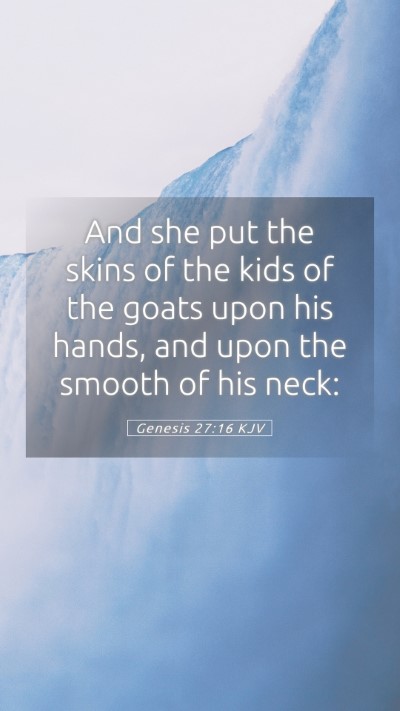Understanding Genesis 27:16 - A Comprehensive Analysis
Genesis 27:16 states: “And she put the skins of the kids of the goats upon his hands, and upon the smooth of his neck.” This verse is part of a larger narrative where Rebekah helps her son Jacob deceive his father Isaac to obtain the blessing meant for Esau, the elder brother. This act, rich in moral and ethical implications, invites various interpretations and reflections.
Bible Verse Meanings: The act of placing goat skins on Jacob's arms signifies the lengths to which Rebekah would go to ensure her son received the rightful blessing, highlighting themes of favoritism and deception within familial relationships.
Bible Verse Interpretations
Different scholars emphasize various aspects of this passage:
- Matthew Henry: He points out how the deception reveals the complexities of human motives. Here, Rebekah's intent, although protective, leads to moral ambiguities.
- Albert Barnes: Barnes discusses the significance of clothing and physical appearance in the context of blessings. The skins were not only a disguise but represented the deeper issue of identity at play in Jacob's acquisition of Esau's blessing.
- Adam Clarke: Clarke notes that the action symbolizes Jacob's need to rely on deceit rather than being forthright. He interprets this as a reflection of Jacob's character, which is seen throughout the Old Testament.
Understanding Scripture
This passage not only provides insight into the characters involved but also reflects larger theological themes such as:
- Divine Sovereignty: The events indicate how God can work through human flaws and sins to fulfill His purposes.
- Human Agency: The story raises questions about the responsibility of individuals in the context of God’s larger plan.
Bible Study Insights
For those engaging in Bible study groups or online Bible study, this verse serves as a focal point for discussions about:
- The ethical implications of deception.
- The role of parental influence in shaping destiny.
- How cultural context affects our understanding of familial relationships.
Historical Context of Bible Verses
Understanding the historical context sheds light on why Rebekah felt compelled to act. In a patriarchal society, the eldest son (Esau) traditionally received the father's blessing, which was a significant monetary and spiritual inheritance. Jacob's usurpation of this blessing is a critical commentary on societal norms.
Application of Bible Verses to Daily Life
This narrative invites reflections on how individuals react in situations of perceived injustice. It also encourages readers to consider the consequences of our choices and the weight of familial loyalty.
Significance of Genesis 27:16
This passage highlights the theme of identity and the lengths individuals may go to assert their place within their family and society. It poses profound questions about righteousness and our actions in pursuit of what we believe to be just.
Bible Cross References
- Genesis 25:23: God's prophecy regarding the elder serving the younger.
- Genesis 27:1-4: The context of Isaac’s age and his intention to bless Esau.
- Genesis 29:14: The eventual reunion of Jacob and Esau highlights the outcomes of deception.
In conclusion, Genesis 27:16 serves as a valuable text for biblical exegesis, exposing the intricacies of human behavior and divine purpose, inviting deeper exploration and discussion for anyone seeking to comprehend Bible verse meanings and interpretations.


